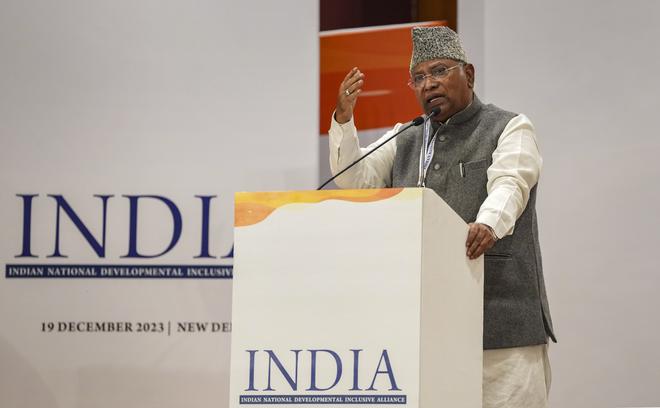Amid suggestions at the Indian National Developmental, Inclusive Alliance (INDIA) meeting here on Tuesday that the bloc finalise its seat-sharing by December 31, West Bengal Chief Minister and Trinamool Congress chief Mamata Banerjee proposed Congress president Mallikarjun Kharge as the prime ministerial face of the alliance.
“He can be India’s first Dalit Prime Minister,” Ms. Banerjee was quoted as saying by a senior Opposition leader.

When Delhi Chief Minister and Aam Admi Party (AAP) convener Arvind Kejriwal endorsed the Congress chief’s name as the first Dalit prime ministerial choice, Mr. Kharge intervened to assert that he had never used his Dalit identity.
At a press conference to convey the decisions of the INDIA bloc, Mr. Kharge said the decision on prime ministerial candidate would be taken after the election. “First we have to win and get a majority, then MPs will decide democratically,” Mr. Kharge told reporters when asked if he could be Opposition’s PM face.
Sources told The Hindu that Ms. Banerjee also suggested the name of Congress general secretary Priyanka Gandhi Vadra to contest from Varanasi against Prime Minister Narendra Modi. However, there was no decision on any of these proposals.
The fourth meeting of the INDIA bloc in Delhi, which was attended by 28 parties and went on for over two hours, however, agreed to hold joint protests on December 22 against the mass suspension of Opposition MPs during the Winter session of Parliament.
The INDIA bloc also adopted a resolution that expressed doubts about the electronic voting machines (EVMs) and suggested that voter verifiable paper audit trail (VVPAT) slips should be handed over to the voters.
“Instead of the VVPAT slip falling in the box, it should be handed over to the voter who shall then place it in a separate ballot box after having verified his or her choice. 100% counting of VPAT slips should then be done,” the resolution said.
At the closed-door meeting, sources said, Congress leader Rahul Gandhi asked if anyone in the room had faith in EVM but everyone stayed silent.
Many of the top leaders, including Bihar Chief Minister Nitish Kumar, his Tamil Nadu counterpart and DMK chief M.K. Stalin, Rashtriya Janata Dal patriarch Lalu Prasad, Samajwadi Party chief Akhilesh Yadav, Shiv Sena (UBT) chief Uddhav Thackeray, Ms. Banerjee, and Mr. Kejriwal were not part of the press conference unlike previous meetings.
Besides Mr. Kharge, Congress leader Rahul Gandhi, NCP leader Sharad Pawar, National Conference leader Farooq Abdullah, CPI(M) general secretary Sitaram Yechury, and CPI general secretary D. Raja were among the senior leaders who were present at the press conference.
The meeting also some tense moments as the Bihar Chief Minister objected to the English translation of his speech at the meeting.
Raising the issue of inauguration of the Ram Mandir at Ayodhya on January 22 and how the BJP would build its political narrative, Mr. Stalin argued for the INDIA bloc’s own narrative. Mr. Stalin also referred to the Congress’s poor performance in the recent Assembly elections and said that “lessons should be learnt from them”.
Mr. Raja of the CPI then pointed out how a limited understanding with them helped the Congress in Telangana and suggested that the INDIA bloc should prepare its narrative on livelihoods.
The meeting saw an in-principle agreement that a group of top leaders from the Congress, Trinamool, DMK, AAP, JD(U), RJD, Shiv Sena, NCP, CPI(M), JMM and the RJD would oversee the seat-sharing between the INDIA constituents.
Sources said the Trinamool Congress stressed that while regional players would support the Congress in over 300 Lok Sabha seats, it [the Congress] should take a back seat in States like Uttar Pradesh, where Akhilesh Yadav (Samajwadi Party) should take the lead, Punjab and Delhi and West Bengal.
When Samajwadi Party leader Ram Gopal Yadav referred to reports that the Congress wanted a tie-up with the Bahujan Samaj Party in Uttar Pradesh, Mr. Kharge dismissed it as a “rumour”.
The formal meeting of the INDIA parties was preceded by smaller meetings between Mr. Kharge and Mr. Gandhi with Sena leaders, Uddhav Thackeray, Aditya Thackeray and Sanjay Raut; then with CPI(M) general secretary Sitaram Yechury; and a third one with Mamata Banerjee. These meetings were aimed at fixing the contours of discussion of the larger meeting.
(With inputs from Shobana K. Nair)







